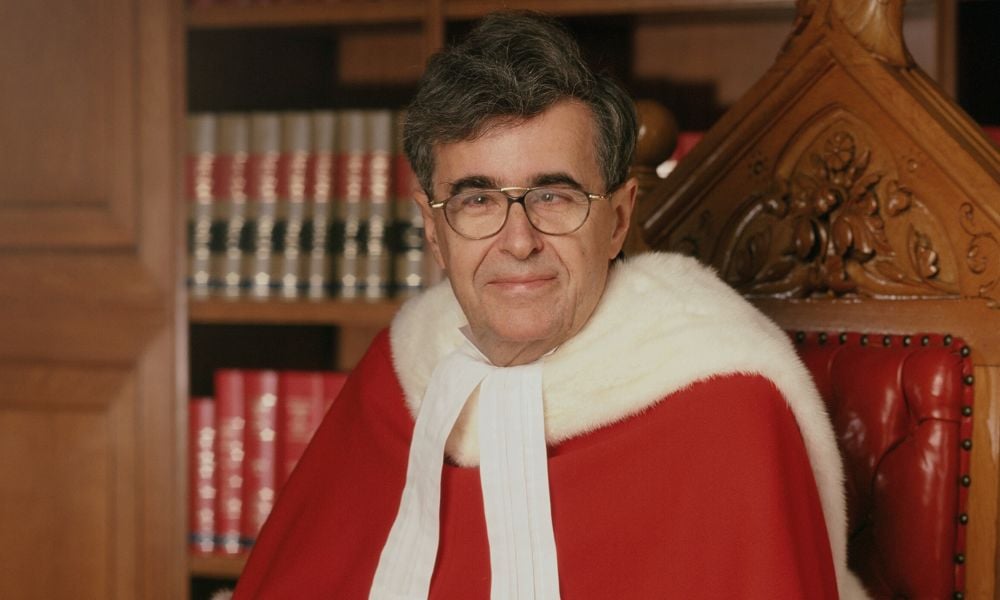'An intellectual of great depth, but he never lost his humanity'

The late former Supreme Court of Canada Justice Louis LeBel always kept the law’s long-term evolution and its impact on individuals in mind in his decisions, two of his former clerks remembered.
Justice LeBel, who died on June 18 at 83, is known for leaving an imprint on administrative law, international law, and Quebec labour law. SCC Chief Justice Richard Wagner said that LeBel’s “love of Quebec civil law is unparalleled” and that he “marvelled” at LeBel’s “skill in marrying civil and common law to strengthen Canada’s unique bijural jurisprudence.”
Natalia Rodriguez, LeBel’s clerk and mentee, says he was also notable for his empathy, understanding, compassion, graciousness, and sense of humour.
Most Read
“The legal profession is generally perceived to be pretty dry and intellectual,” says Gabriel Poliquin, also a former clerk and mentee. “He was certainly an intellectual of great depth, but he never lost his humanity and his humour.”
LeBel attended law school at Laval University and earned an LL.M. at the University of Toronto. He was called to the bar in 1962, practising in Quebec City until he was appointed to the Quebec Court of Appeal in 1984. Former prime minister Jean Chretien appointed LeBel to the Supreme Court of Canada in 2000, where he served until his retirement in 2014.
As someone with a keen interest in literature and history, LeBel tended to take a “historical long view” of the law, a perspective he would infuse into his decisions, says Rodriguez, a partner at Conway Baxter Wilson LLP in Ottawa, and a Law Society of Ontario bencher.
“He wasn't just about the here and now,” she says. “It was about the evolution of the law, where we started from, what happened, and how things have evolved.”
There are two aspects to his legal legacy, says Poliquin, who has his own firm in Ottawa and practises civil and commercial litigation with a focus on public law. One, LeBel always strived for clarity in the law. His decisions were easy to understand, intuitive, and he wrote in a manner that would be usable and intelligible for the public.
The second aspect is the “deep humanity behind the judicial function,” he says.
“He was a deeply ethical man. He was a very widely read man and had an understanding of the humans that are behind the law – behind those who make the law, but especially those who undergo the effects of the law.”
“He always had that in mind that even though at the Supreme Court we're dealing, usually, in pretty high levels of abstraction, we must never forget that there are real people that are impacted by the decisions of the court,” says Poliquin.
Among LeBel’s more significant judgments was Club Resorts Ltd. v. Van Breda, 2012 SCC 17, which reformed the common law around determining territorial jurisdiction. The case involved a pair of lawsuits against a Cuban resort at which one Canadian had died, and another had sustained a catastrophic injury. The company that ran the resort, which was incorporated in the Cayman Islands, unsuccessfully argued that Ontario courts lacked jurisdiction and that a Cuban court would be a more appropriate forum.
Before Van Breda, the “real and substantial connection” test was “very complicated,” says Poliquin, who served as clerk while the case was before the SCC. “Within the parameters of the common law, he essentially cleaned house and made a very understandable, very predictable test for territorial jurisdiction.”
“It's a seminal judgment because it clarifies a lot of things in the area of private international law, which is notoriously complex.”
Another notable ruling LeBel authored was Teva Canada Ltd. v. Pfizer Canada Inc., 2012 SCC 60, in which the court found that the pharmaceutical giant Pfizer’s patent for Viagra did not adequately describe the invention and was invalid.
“It made international headlines because it allowed generics to start producing Viagra under a generic label,” says Rodriguez.










